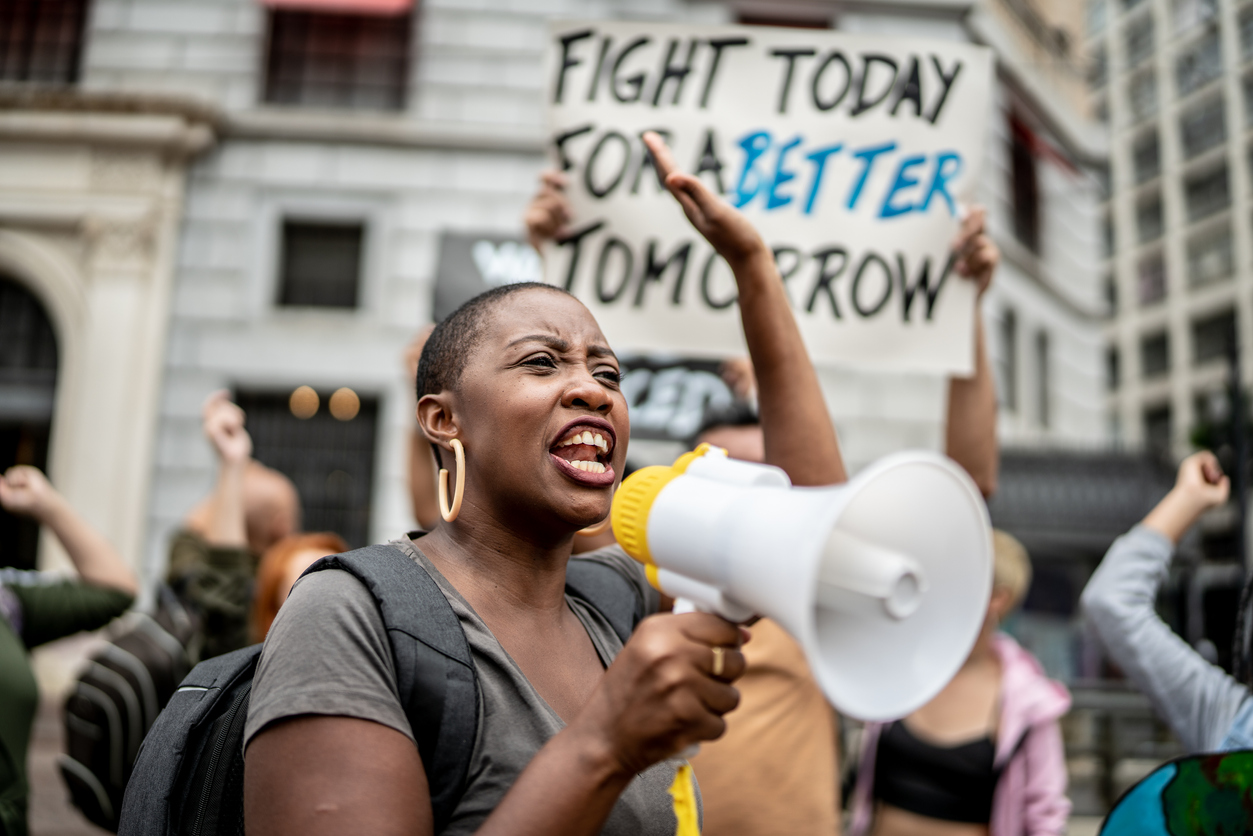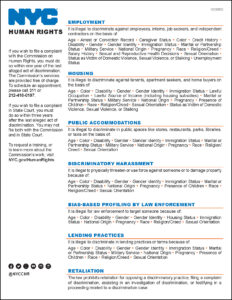Bill of Rights to the U.S. Constitution
Everyone in the U.S. has basic rights under the U.S. Constitution. One place to start when learning about your rights is with The Bill of Rights, which is the first 10 amendments to the U.S Constitution.
First Amendment: Freedom of religion, freedom of speech and the press, the right to assemble, the right to petition the government.
Second Amendment: Congress can’t stop people from having and carrying weapons.
Third Amendment: You don’t have to let soldiers live in your house, except if there is a war, and even then Congress needs to pass a law and set the rules.
Fourth Amendment: Protection against unreasonable search and seizure.
Fifth Amendment: No one can be tried for a serious crime unless indicted (accused) by a grand jury. No one can be forced to testify against herself or himself. No one can be punished without due process of law. People must be paid for property taken for public use
Sixth Amendment: People have a right to a speedy trial, to legal counsel, and to confront their accusers.
Seventh Amendment: People have the right to a jury trial in civil suits exceeding $20.
Eighth Amendment: Protection against excessive bail (money to release a person from jail), stiff fines, and cruel and unusual punishment.
Ninth Amendment: Rights that are enumerated cannot infringe upon rights that are not listed in the Constitution.
Tenth Amendment: Anything that the Constitution doesn’t say that Congress can do, is left up to the states and to the people.
Rights for Protected Groups and NYC Human Rights Law
There are some rights that everyone is guaranteed under the U.S. Constitution. However, legal protections and rights can vary by state and by city. It is important to know your rights in the place where you live.
NYC Human Rights Law does not allow discrimination in NYC for the areas of:
- employment
- housing
- public accommodations
- discriminatory harassment,
- bias-based profiling by law enforcement,
- lending practices
- retaliation
Click the image below to see the groups that are protected under each of these areas. If you think you are experiencing discrimination because of one of these areas, don’t forget that you have rights!
To report an incident of discrimination: call 311 and say “human rights” or call directly at (212) 416-0197. You may also report discrimination online.
Rights for Women and Gender-Expansive Persons in NYC
NYC Human Rights Law prohibits discrimination from employers, housing, and providers of public accommodations on the basis of:
- Sexism and gender
- Pregnancy
- Caregiver status for children or family
- Survivors of domestic violence, sex offenses, and stalking
- Presence of children
For detailed information, see the Women’s Rights Brochure and the Protections Against Discrimination Based on Sexual Orientation, Gender Identity, and Gender Expression Brochure.
What to Do if Your Rights Are Violated
If You’re Stopped by the Police (NYCLU) – know that you have the right to remain silent!
Potential scenarios:
- If you have a police encounter
- If you are stopped, questioned, and/or frisked
- If you are stopped in your car
- If police come to your home
- If you are arrested or taken to a police station
Remain calm. Take deep breaths.
One helpful breathing technique to help you stay calm is called “box” or “square breathing” and goes like this:
- Inhale for 4 seconds
- Hold for 4 seconds
- Exhale for 4 seconds
- Pause for 4 seconds
Learn More About Your Rights
National Rights in the United States
The following are scenarios and basic rights under the U.S. Constitution and civil rights laws provided by the ACLU. Click the links according to your own identity and needs.
Disability Rights | Immigrants’ Rights | LGBTQ Rights | Prisoners’ Rights | Protesters’ Rights | Race, Ethnicity, or National Origin-Based Discrimination | Sex Discrimination | Stopped by the Police | Students’ Rights
Take Action: Protect Your Rights and Advocate for Expanded Rights
Despite how various “rights” become protected under the law, there needs to be a sustained advocacy from social movements to produce meaningful material changes in people’s lives.
Organize a Tenant Association
The right of tenants to organize into associations is specifically protected by the laws of New York State, as well as the Constitution of the United States.
Join a Union
Unions are about building power and making workplaces better, which includes protecting your rights and the things you care about like affordable health care and fair pay. Unions are one of the best examples of the importance of collective power and organizing.
- Learn from The American Federation of Labor and Congress of Industrial Organizations (AFL-CIO) – https://aflcio.org/what-unions-do
- Take Action (send letters, sign petitions, join a union or start your own)
Advocate for Expanded Voting Rights
- Join the Let NY Vote Coalition: Text “VoteNY” to 97779 for updates on LNYV actions & events and/or join a Working Group! Email LetNyVote@Gmail.com to join a group and help protect and enhance the right to vote.
- Sign petitions and get involved with Common Cause New York
Support Candidates Who Want to Uphold or Expand Your Rights
- Vote! Find everything you need to know at vote411.org.
- Volunteer with Rock The Vote to help register young voters and defend voting rights!
- Get Out the Vote (GOTV) through Mobilize.
Get Free Legal Assistance: Find Options here!


 Make the Switch to our new mailing list!
Make the Switch to our new mailing list!